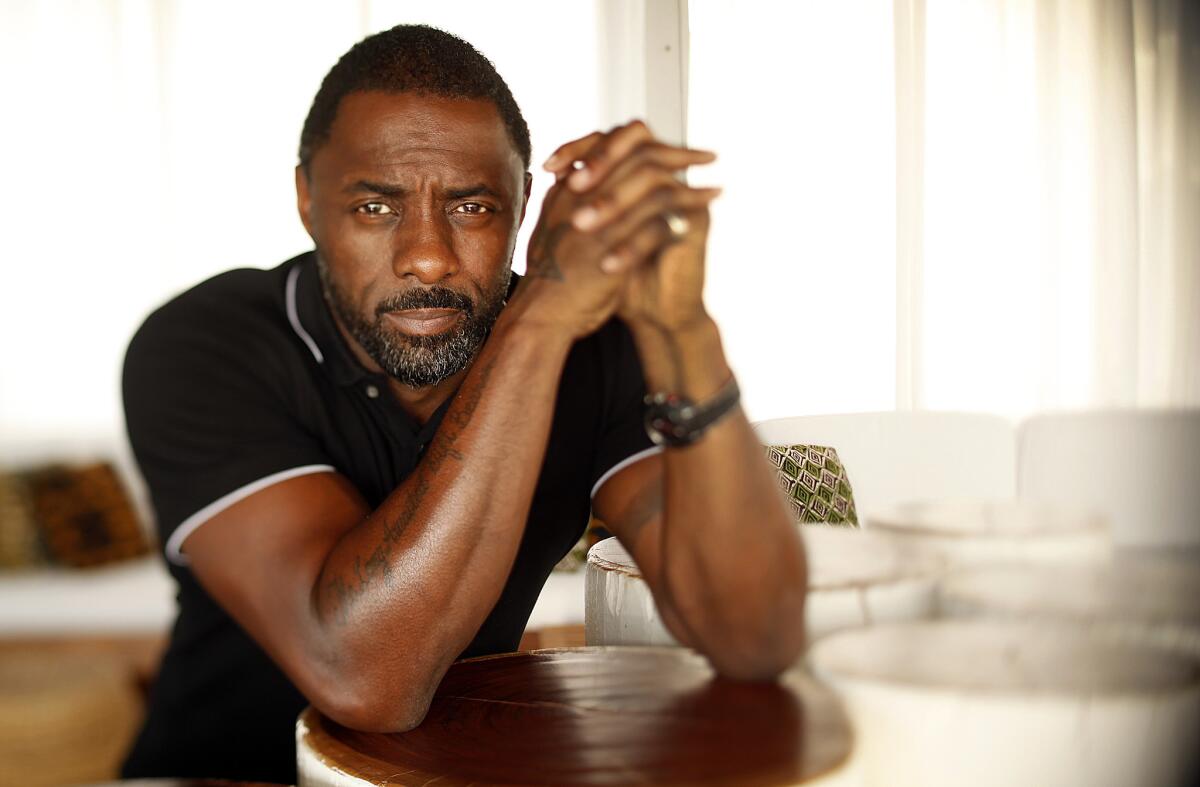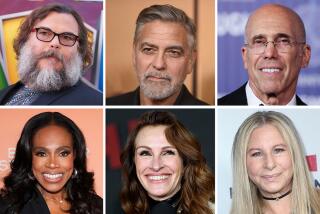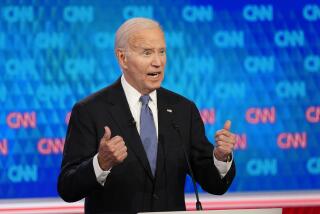Idris Elba ‘too street’ for James Bond: Moviedom has its Nicki-Miley beef

- Share via
If the amount of attention showered on Idris Elba’s non-Bond casting translated into Bond dollars, James Bond would be an even more successful franchise than it already is. And that’s saying something.
On Tuesday the news took yet another turn when an interview that author Anthony Horowitz gave to the Mail on Sunday questioning Elba as the possible superspy blew up Twitter.
Horowitz is a British thriller writer who has penned the latest Bond novel. He wasn’t so, um, keen on Elba as the next 007.
“Idris Elba is a terrific actor, but I can think of other black actors who would do it better,” he told the publication. “For me, Idris Elba is a bit too rough to play the part. It’s not a color issue. I think he is probably a bit too ‘street’ for Bond. Is it a question of being suave? Yeah.”
The comments lit up social media, as users called racism on Horowitz. Among the common sentiments:
“Idris Elba is “a bit too street for Bond,” said the writer of a new Bond book. Just say “black,” it’s easier.”--@JamilSmith
It’s worth noting what the Horowitz comment is: a problematic, very likely offensive pronouncement with racist undertones.
But it’s also worth noting what it’s not: a meaningful statement. Horowitz has literally no say in whether Elba will get the part, so what he thinks really doesn’t matter. (In fact, he’s employed by the Ian Fleming estate, not even the Eon Prods. that backs the films.) I suppose you could say he’s an important voice in the Bond franchise, but well, there are a dozen people you could come up with who better fit the bill. Two or three dozen, really.
And here’s a more salient point. Horowitz can’t say who should get the part because the people in charge can’t say yet. The Broccolis — Barbara Broccoli and Michael G. Wilson, who steward the franchise at Eon — have been focused on finishing the next film, with current Bond Daniel Craig, ahead of its November release.
And Elba, while he’s certainly a plausible candidate, does not have any real heat. No one does, not beyond the meeting and consideration stage.
Much of the Elba talk comes out of the kind of speculation that bookies and a certain sort of Web pot-stirrers like to indulge in. The bit that is more grounded — an Amy Pascal email revealed during the Sony hack last year in which she expressed interest in Elba — is beside the point because 1) Sony is not the only arbiter in Bond 2) Pascal no longer runs Sony anyway.
And here’s maybe the most important part. Elba himself seems sick of the talk. “Honestly, it’s a rumor that’s really starting to eat itself,” he said in April. “If there was ever any chance of me getting Bond, it’s gone.” Yet the Bond-Elba news cycle continues.
This story is the kind of new meta-narrative that now dominates, often with indifference to the substantive matter at hand. Many of us know of Nicki Minaj and Taylor Swift’s Twitter beef over whether Minaj was snubbed from a VMA nomination because she isn’t white; a lot fewer could tell you which video it was Minaj was upset over. (Even more people could tell you about the Miley-Nicki beef from Sunday night, which has even less to do with the music.)
These are stories that exist discretely, playing out as a kind of superimposed track on the actual cultural product. Elba has not come close to being cast as Bond. He may not even have had a meeting about playing Bond. But the discussion of the viability of his candidacy is, for certain quarters, the gift that keeps on giving. (This isn’t the first time comments from someone in the Bond universe over Elba have struck a nerve: Roger Moore may or may not have said something about Elba in the role back in the spring.)
Which isn’t to say the discussion is unimportant. Far from it. Not surprisingly, this story is about race, just as a number of the others have been. In fact, there’s a telling parallel in Horowitz’s comment about Elba being “too street” to the Miley-Nicki-Taylor spats, which has at its heart the question of a) whether whites get preferential treatment at music awards and b) whether an awards-show host was engaging in a nasty bit of racial stereotyping. Not for nothing did some on Twitter commenting on Elba reply with a “Horowitz, what’s good?,” a call back to Minaj’s comment on Sunday.
There are significant ideas at stake in the Elba-Horowitz affair. Should we be beholden to traditional notions of characters or are these characters, by their nature, malleable, reflecting society’s changing attitudes? Are there racial signifiers that make one black actor more compelling than another? And is changing a character’s race a violation of the author’s intent or, to the contrary, a continuation of it? Fleming, after all, described a boy who lost his parents at 11 and entered the spy racket as a way to find purpose and meaning -- a point that could be used to argue that a “street” Bond, whatever that may be, actually fits the character quite nicely.
The discussion is interesting, in other words, for what it tells us about race, and cultural attitudes, and how the film industry interprets each. It probably doesn’t say much about who will play James Bond, though.
Twitter: @ZeitchikLAT
More to Read
Only good movies
Get the Indie Focus newsletter, Mark Olsen's weekly guide to the world of cinema.
You may occasionally receive promotional content from the Los Angeles Times.











